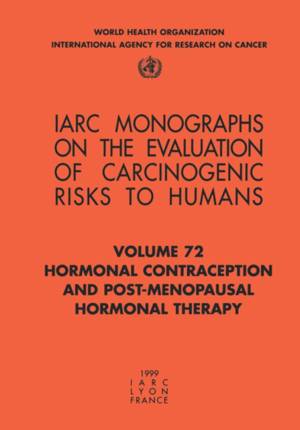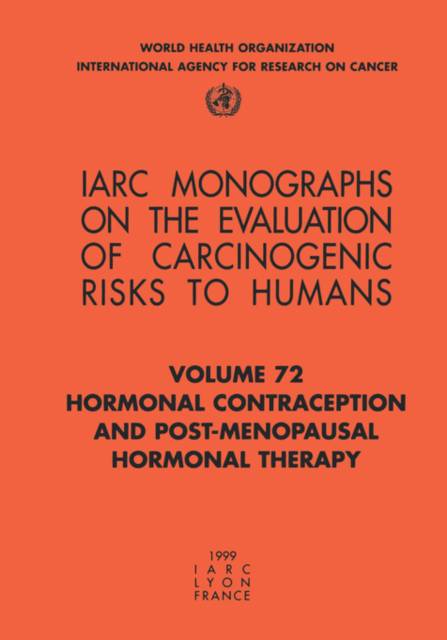
- Retrait gratuit dans votre magasin Club
- 7.000.000 titres dans notre catalogue
- Payer en toute sécurité
- Toujours un magasin près de chez vous
- Retrait gratuit dans votre magasin Club
- 7.000.0000 titres dans notre catalogue
- Payer en toute sécurité
- Toujours un magasin près de chez vous
Hormonal Contraception and Post-Menopausal Hormonal Therapy
IARC Monographs on the Evaluation of Carcinogenic Risks to Humans
The International Agency for Research on Cancer
73,95 €
+ 147 points
Description
Evaluates evidence for an increased risk of cancer in women using combined oral contraceptives, progestogen-only hormonal contraceptives, post-menopausal estrogen therapy, and post-menopausal estrogen-progestogen therapy. Although the carcinogenicity of these preparations has been extensively investigated, the book stresses the many complex methodological issues that must be considered when interpreting findings and weighing results. Evidence of an association between use of these preparations and positive effects on health, including a reduced risk of some cancers, is also critically assessed. The first and most extensive monograph evaluates evidence of an association between the use of combined oral contraceptives and cancer at nine sites. Concerning breast cancer, the evaluation concludes that, even if the association is causal, the excess risk for breast cancer associated with patterns of use that are typical today is very small. Studies of predominantly high-dose preparations found an increased risk of hepatocellular carcinoma in the absence of hepatitis viruses. Citing these findings, the evaluation concludes that there is sufficient evidence in humans for the carcinogenicity of combined oral contraceptives. The evaluation also found sufficient evidence for the carcinogenicity of some, but not all, combined preparations in animals. Combined oral contraceptives were classified as carcinogenic to humans. The evaluation also cites conclusive evidence that these agents have a protective effect against cancers of the ovary and endometrium. Progestogen-only contraceptives are evaluated in the second monograph, which considers the association with cancer at six sites. The evaluation found no evidence of an increased risk for breast cancer. Although the evaluation found sufficient evidence in animals for the carcinogenicity of medroxyprogesterone acetate, evidence for the carcinogenicity of progestogen-only contraceptives in humans was judged inadequate. Progestogen-only contraceptives were classified as possibly carcinogenic to humans.
The third monograph, on post-menopausal estrogen therapy, considers evidence of an association with cancer at eight sites. Findings from a large number of epidemiological studies indicate a small increase in the risk of breast cancer in women who have used these preparations for five years or more. Studies consistently show an association between use of post-menopausal estrogen therapy and an increased risk for endometrial cancer. Data on the association with other cancers were either inconclusive or suggested no effect on risk. The evaluation concludes that post-menopausal estrogen therapy is carcinogenic to humans. The final monograph evaluates the association between the use of post-menopausal estrogen-progestogen therapy and cancer at four sites. The evaluation of limited data on breast cancer found an increased relative risk observed with long-term use. Data were judged insufficient to assess the effects of past use and of different progestogen compounds, doses, and treatment schedules. For endometrial cancer, the evaluation found an increase in risk relative to non-users when the progestogen was added to the cycle for 10 days or fewer. Post-menopausal estrogen-progestogen therapy was classified as possibly carcinogenic to humans. Concerning post-menopausal therapy in general, the book notes that evidence of carcinogenic risks must be placed in perspective of potential benefits. The prevention of osteoporotic fractures is cited as the best-established benefit. Evidence also suggests that estrogen prevents heart disease and may prevent memory loss and dementia.
The third monograph, on post-menopausal estrogen therapy, considers evidence of an association with cancer at eight sites. Findings from a large number of epidemiological studies indicate a small increase in the risk of breast cancer in women who have used these preparations for five years or more. Studies consistently show an association between use of post-menopausal estrogen therapy and an increased risk for endometrial cancer. Data on the association with other cancers were either inconclusive or suggested no effect on risk. The evaluation concludes that post-menopausal estrogen therapy is carcinogenic to humans. The final monograph evaluates the association between the use of post-menopausal estrogen-progestogen therapy and cancer at four sites. The evaluation of limited data on breast cancer found an increased relative risk observed with long-term use. Data were judged insufficient to assess the effects of past use and of different progestogen compounds, doses, and treatment schedules. For endometrial cancer, the evaluation found an increase in risk relative to non-users when the progestogen was added to the cycle for 10 days or fewer. Post-menopausal estrogen-progestogen therapy was classified as possibly carcinogenic to humans. Concerning post-menopausal therapy in general, the book notes that evidence of carcinogenic risks must be placed in perspective of potential benefits. The prevention of osteoporotic fractures is cited as the best-established benefit. Evidence also suggests that estrogen prevents heart disease and may prevent memory loss and dementia.
Spécifications
Parties prenantes
- Auteur(s) :
- Editeur:
Contenu
- Nombre de pages :
- 660
- Langue:
- Anglais
- Collection :
- Tome:
- n° 72
Caractéristiques
- EAN:
- 9789283212720
- Date de parution :
- 01-08-99
- Format:
- Livre broché
- Format numérique:
- Trade paperback (VS)
- Dimensions :
- 178 mm x 254 mm
- Poids :
- 1152 g

Les avis
Nous publions uniquement les avis qui respectent les conditions requises. Consultez nos conditions pour les avis.






